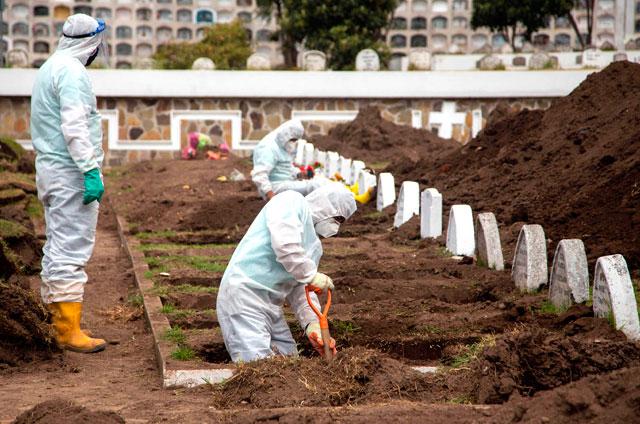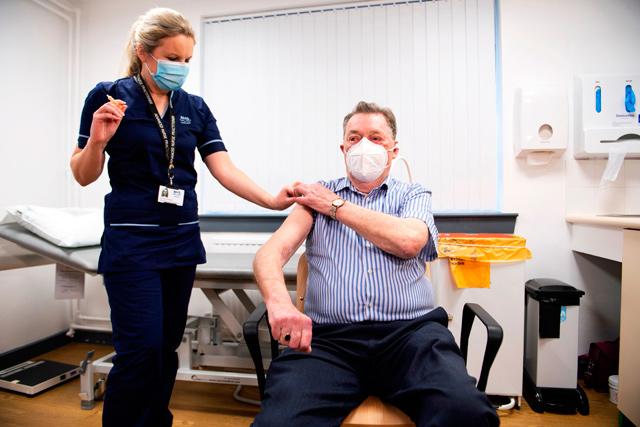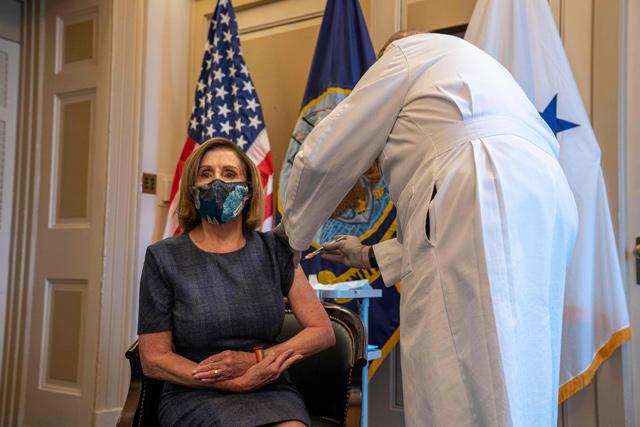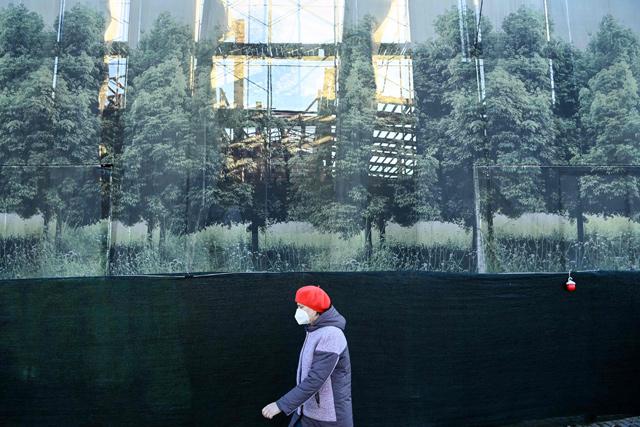You are here
Trump says pandemic to 'get worse', Australia sees record infections
By AFP - Jul 23,2020 - Last updated at Jul 23,2020

Workers wearing biosecurity equipment prepare graves for alleged victims of the new coronavirus Covid-19, at the San Diego Cemetery, in the Colonial Centre in Quito, on Tuesday (AFP photo)
WASHINGTON/ FRANKFURT AM MAIN — The coronavirus death toll in the United States has spiked again with Donald Trump conceding the pandemic crisis will get worse, as record infections in Australia underscored second-wave dilemmas globally.
Nearly 15 million cases have been confirmed and 615,000 lives lost since the virus was first detected in China late last year.
Almost a quarter of those deaths have been in the US, the worst-hit nation after a scattershot response from Trump that has been dominated by him repeatedly downplaying the severity of the crisis.
With authorities reporting Tuesday the highest daily nationwide death toll in weeks of nearly 1,000, Trump adopted a newly serious tone.
“It will probably, unfortunately get worse before it gets better,” the president told reporters during his first formal pandemic briefing for nearly three months.
Other nations, which had eased crippling lockdowns after the virus had appeared to fade, are struggling to combat second waves.
Australia on Wednesday reported more than 500 infections in a day, posting a record high nearly four months after cases appeared to have peaked.
In Melbourne, Australia’s second-biggest city where most of the new infections have occurred, wearing face masks will be mandatory from Thursday.
Second wave fears were also growing in Japan’s capital, with hundreds of new cases reported each day over the past week, promoting authorities to urge people to stay home during an upcoming national holiday.
“The infections are spreading not only among young people but also among middle-aged and older people,” Tokyo governor Yuriko Koike said, after new clusters were found in city restaurants and theatres.
France also said transmissions were increasing again over the summer holiday season, after the country suffered one of Europe’s worst outbreaks during the spring.
Countries with fragile health systems have yet to enjoy even a brief reprieve from the virus, with Mexico on Tuesday passing 40,000 deaths — the pandemic’s fourth-highest national toll.
Fresh data from a study in India also suggested that the virus was spreading much further than charted, and that official figures were far lower than reality.
The study said nearly one quarter of the population in New Delhi, India’s capital, had contracted the virus.
This would equate to roughly five million infections in New Delhi versus the official data showing 125,000 confirmed cases.
Vaccine hopes
However, global markets have been buoyed by a massive European Union aid package agreed on this week to staunch the economic havoc wrought by the pandemic.
Lawmakers in Washington are also preparing a new stimulus package.
Hopes for an end to the crisis, which has left tens of millions unemployed around the world and crippled global commerce, have hinged on the production of a vaccine.
One leading candidate is being developed in part by pharmaceutical giant AstraZeneca, with promising results from clinical trials published on Monday.
But the firm’s chief said a global roll-out was not likely to begin until the end of the year.
Millions around the world have recovered from the disease in lieu of a vaccine, but those who survive severe cases face a long, hard road to regain their health.
In Brazil, 63-year-old Elenice da Silva was recovering from a nearly three-month battle with the virus that left her temporarily unable to speak.
Patients like da Silva have been left suffering from atrophied muscles or chronic problems affecting their lungs and other vital organs.
“Intensive care was awful. But now I’m feeling marvelous,” she told AFP during her recovery. “I’m going to bake a giant cake for everyone.”
The US government has agreed to pay almost $2 billion for 100 million doses of a potential coronavirus vaccine, German firm BioNTech said on Wednesday.
BioNTech, which is developing the drug with US pharma giant Pfizer, said in a statement that American people would receive the future vaccine “for free” in line with the Trump administration’s “commitment for free access for COVID-19 vaccines”.
Under the agreement, the US government has placed an initial order for 100 million doses to be delivered if regulatory approval is granted.
The US government also has an option to purchase as many as 500 million additional doses, BioNTech added.
Labs around the world are racing to produce a vaccine to help end the worst health crisis in over a century.
More than 200 candidate vaccines are currently being developed with roughly two dozen at the stage of clinical trials with human volunteers.
BioNTech and Pfizer have narrowed their vaccine candidates down to two frontrunners and waiting for the green light to begin a mass trial involving 30,000 healthy volunteers, which may happen later this month.
Subject to successful outcomes and regulatory approvals, Pfizer and BioNTech expect to manufacture up to 100 million doses by the end of 2020, and “potentially more than 1.3 billion doses by the end of 2021”.
Their vaccine method relies on using messenger RNA, genetic code that slips into human cells to make them generate antibodies that are specifically tailored to the coronavirus.
Trials so far have shown that their treatment triggers “robust” antibody and T cell immune responses against the novel coronavirus, according to BioNTech.
The agreement between the US, Pfizer and BioNTech “increases the odds that we will have a safe, effective vaccine as soon as the end of this year”, said US health official Alex Azar.
A BioNTech spokeswoman told AFP that two injections would probably be needed for maximum protection, with the booster shot following seven days after the first injection.
Based on the price paid by the US government, it would therefore cost $39 to immunise a person against the deadly virus.
Oxford University and AstraZeneca are also working on a vaccine, which they have vowed to make available “at cost price”, amounting to roughly $2.90 per unit.
Related Articles
LONDON — Britain on Monday began rolling out the Oxford-AstraZeneca coronavirus vaccine, a possible game-changer in fighting the disease wor
WASHINGTON — The United States on Friday authorised Moderna's COVID-19 vaccine for emergency use, paving the way for millions of doses of a
PARIS — A vaccine jointly developed by Pfizer and BioNTech was 90 per cent effective in preventing Covid-19 infections in ongoing Phase 3 tr



















